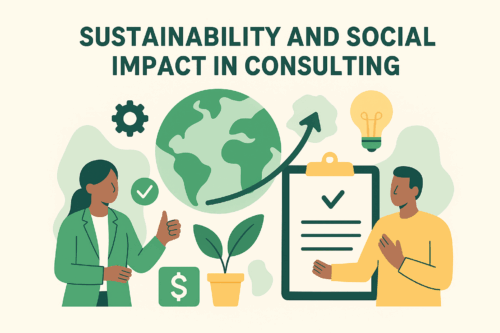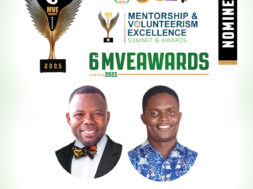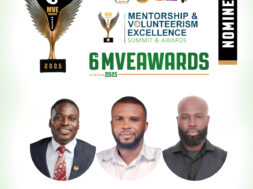Sustainability and Social Impact in Consulting

Purpose-Driven Consulting
The global business landscape is rapidly evolving, and sustainability has shifted from being a “nice-to-have” to a core business imperative. Today, consulting firms are increasingly positioning themselves as drivers of purpose-driven business models, ensuring that companies align with environmental, social, and governance (ESG) principles. As entrepreneurs, startups, and corporations navigate the future, sustainability and social impact consulting has become a powerful enabler of both profitability and responsibility.
The Role of ESG in Consulting
Integrating ESG Frameworks
Consultants now embed ESG frameworks into corporate strategy, ensuring businesses comply with environmental and social benchmarks. Startups and established firms alike are encouraged to assess carbon footprints, labor practices, governance policies, and ethical sourcing. ESG is not just compliance—it’s a blueprint for resilience and competitiveness in a changing global economy.
ESG for Business Value
Adopting ESG practices boosts brand reputation, builds trust among stakeholders, and attracts investors. For entrepreneurs, positioning a business as socially and environmentally responsible can open opportunities in global supply chains and strengthen market credibility.
Impact Assessment Services
Measuring Contributions
A key component of sustainability consulting is impact assessment. Tools like the Global Reporting Initiative (GRI), Carbon Disclosure Project (CDP), and Life Cycle Assessment (LCA) software help businesses measure and report their contributions to the planet and society.
Case Examples
Firms that adopt structured impact reporting often experience better investor confidence, improved customer loyalty, and stronger internal accountability. These outcomes demonstrate how data-driven insights can transform sustainability goals into measurable results.
Green Certifications and Standards
Overview of Certifications
Green certifications serve as proof of commitment. Programs such as B Corp Certification, ISO 14001, and the UN Global Compact validate that a business operates with sustainability at its core.
Consultants’ Role
Consultants play a vital role in guiding organizations through certification processes. Achieving these standards not only strengthens brand trust but also enhances investor appeal and competitiveness in eco-conscious markets.
Eco-Conscious Business Strategies
Circular Economy Models
Consulting firms are helping businesses adopt circular economy strategies that minimize waste and maximize resource efficiency. From designing reusable packaging to creating low-carbon operations, these models reduce environmental impact while unlocking new revenue streams.
Sustainable Supply Chains
Sustainability consulting also focuses on building transparent, ethical supply chains. Consumers and regulators increasingly demand visibility into sourcing, production, and distribution, making this a key driver of long-term business resilience.
Investor and Consumer Demand
Attracting ESG-Investors
Investors are increasingly prioritizing businesses with measurable ESG commitments. Sustainability consulting equips firms to meet reporting requirements that satisfy socially responsible investors.
Consumer Trends
At the same time, consumers prefer eco-conscious brands. Businesses that communicate authentic sustainability efforts benefit from stronger customer loyalty and competitive differentiation in crowded markets.
Challenges in Sustainability Consulting
Balancing Profit and Sustainability
One of the biggest challenges is balancing short-term profitability with long-term sustainability. Small and medium-sized enterprises (SMEs) often struggle with the costs of implementing eco-conscious models.
Greenwashing Risks
Consultants must help businesses avoid greenwashing—misleading claims of sustainability that damage credibility. Transparency and third-party verification are essential in overcoming these risks.
Cost Barriers
Adopting ESG strategies can be costly, particularly for startups. However, access to microfinance programs, grants, and partnerships can ease these barriers and make sustainability more achievable.
Future of Sustainability in Consulting
Digital Tools in ESG
The future of sustainability consulting lies in digital innovation. Tools like AI, blockchain, and advanced analytics are revolutionizing ESG tracking and reporting. For example, blockchain enables product traceability, while AI enhances predictive environmental analysis.
Global Regulations and Trends
As global frameworks like the Paris Agreement and UN Sustainable Development Goals (SDGs) evolve, businesses will face stricter regulatory requirements. Consulting firms will play an increasingly critical role in helping organizations align with these emerging standards.
Real-World Applications of Sustainability Consulting
Corporate Sector
Global corporations such as Unilever, Microsoft, and Patagonia have invested heavily in sustainability consulting to embed circular economy principles and reduce their environmental footprint. Consultants guided them in achieving net-zero emissions targets, responsible sourcing, and ESG reporting that attracts responsible investors.
SMEs and Startups
For small and medium-sized enterprises (SMEs), sustainability consulting helps bridge resource gaps. Many SMEs use consulting services to redesign packaging with eco-friendly materials, adopt renewable energy solutions, or join fair trade networks. These changes not only cut costs in the long run but also attract conscious consumers.
Government and Policy Support
Governments worldwide, including in Africa, are engaging consulting firms to create sustainability roadmaps. From renewable energy adoption to sustainable agriculture projects, consultants provide frameworks that align with national climate action goals.
The Triple Bottom Line: People, Planet, Profit
A central framework in sustainability consulting is the Triple Bottom Line (TBL), which measures success not just by profit, but also by impact on people and the planet.
- People: Consultants help businesses create fair labor policies, community upliftment programs, and inclusive practices.
- Planet: Strategies focus on reducing carbon emissions, adopting clean energy, and promoting biodiversity.
- Profit: Sustainable models often uncover new efficiencies, reduce waste, and improve profitability in the long run.
This holistic approach ensures that businesses are profitable yet responsible, fostering long-term resilience.
The Consultant’s Toolkit for Sustainability
Technology-Driven Insights
Modern sustainability consultants rely on AI-powered analytics, carbon footprint calculators, and blockchain solutions to deliver accurate ESG insights. For example:
- AI predicts energy consumption patterns.
- Blockchain ensures transparent supply chains.
- LCA software evaluates environmental impacts across a product’s life cycle.
Stakeholder Engagement Frameworks
Consultants also facilitate stakeholder dialogues, ensuring businesses understand consumer expectations, investor requirements, and community needs. These frameworks make sustainability strategies more inclusive and impactful.
Case Study: A Success Story in Sustainable Transformation
One inspiring example is Interface, a global flooring company. With consultant guidance, the company launched “Mission Zero” to eliminate negative environmental impact by 2020. By redesigning its supply chain, recycling materials, and adopting renewable energy, Interface achieved significant milestones, becoming a global sustainability leader while maintaining profitability.
This case underscores how consultants can help transform ambitious sustainability goals into measurable results.
Opportunities for Entrepreneurs in Sustainability Consulting
Entrepreneurs and startups also benefit from this trend by:
- Launching green consulting startups focusing on SMEs in Africa and Asia.
- Offering specialized services like carbon footprint audits, sustainable packaging design, or ESG reporting for early-stage companies.
- Partnering with NGOs and governments to drive community-based sustainability projects.
As investor capital increasingly flows toward sustainable ventures, entrepreneurs who integrate consulting with innovation will lead the next wave of purpose-driven business growth.
Why Sustainability Consulting Matters More Than Ever
The urgency of climate change, rising consumer awareness, and stricter global regulations mean that businesses can no longer ignore sustainability. Consulting firms act as strategic partners that guide organizations to:
- Future-proof operations against environmental risks.
- Win investor trust through credible ESG strategies.
- Differentiate brands in highly competitive markets.
In essence, sustainability consulting isn’t just about compliance—it’s about building businesses that last.
Challenges in Implementing Sustainability Consulting
While sustainability and social impact in consulting are gaining momentum, businesses face practical hurdles that cannot be overlooked:
1. Balancing Profitability with Responsibility
Many organizations hesitate to adopt sustainable practices because they fear higher upfront costs. Consultants must demonstrate that sustainability often leads to long-term savings through efficiency, reduced waste, and enhanced brand loyalty.
2. Risk of Greenwashing
Some companies adopt sustainability labels without making real changes. Consultants play a critical role in ensuring transparency and building credible strategies backed by measurable results.
3. Cost Barriers for SMEs
Smaller businesses often lack the resources to implement complex ESG frameworks. Here, consultants design scalable, low-cost models that align with their size while still driving measurable impact.
The Future of Sustainability and Social Impact in Consulting
The consulting industry is on the brink of transformation as sustainability shifts from optional to essential. Several trends are shaping the future:
1. Digital Tools Driving ESG Reporting
Software platforms are making real-time ESG tracking more accessible. For instance, carbon footprint dashboards and blockchain-based supply chain tracking are becoming standard.
2. Stricter Global Regulations
Regions like the EU and North America are enforcing stricter ESG reporting rules. Consultants will be indispensable in helping businesses navigate compliance while staying competitive.
3. Purpose-Driven Entrepreneurship
The next wave of entrepreneurs will build businesses with sustainability at their core, not as an afterthought. Consulting firms that specialize in green innovation and impact strategies will thrive in this new ecosystem.
Building a Purpose-Driven Future
Sustainability and social impact in consulting are no longer niche services—they are becoming the foundation of modern business strategy. By integrating ESG frameworks, adopting eco-conscious business models, and prioritizing the triple bottom line, consultants help companies create lasting value for people, planet, and profit.
As investor expectations grow and consumers demand transparency, sustainability consulting is set to become a critical driver of competitive advantage and global progress. Businesses that embrace these practices today will lead the market tomorrow.
Practical Strategies for Businesses and Consultants
To fully harness the benefits of sustainability and social impact, both businesses and consultants can implement actionable strategies:
1. Start with an ESG Audit
Before launching sustainability initiatives, businesses should evaluate their current practices—from energy use to supply chains. Consultants can help identify areas for improvement and develop a roadmap for change.
2. Focus on Scalable Wins
Small steps, such as reducing packaging waste, adopting renewable energy sources, or switching to ethical suppliers, can create meaningful impact without overwhelming resources.
3. Embrace Technology for Transparency
Digital tools like Life Cycle Assessment (LCA) software and carbon footprint tracking platforms help businesses track progress and build trust with investors and consumers.
4. Engage Employees and Communities
Sustainability isn’t only about operations—it’s also about people. Engaging staff in green initiatives and supporting community projects helps create a purpose-driven culture.
Global Examples of Sustainability Consulting in Action
- Unilever’s Sustainable Living Plan (influenced by thought leader Paul Polman) shows how multinational corporations can align growth with sustainability.
- B Lab’s B Corp Certification has helped startups worldwide prove their commitment to social and environmental impact.
- African social enterprises are integrating circular economy models, turning waste into products, and creating new income opportunities.
These examples highlight how consulting firms provide expert guidance and measurable frameworks that drive both profitability and social good.
You can also read on: https://baobabentrepreneur.com/the-rise-of-digital-first-consulting-models/
The Competitive Edge of Purpose-Driven Business Models
In today’s global economy:
- Investors are prioritizing companies with strong ESG commitments.
- Consumers are choosing brands that reflect their values.
- Employees prefer working for organizations that contribute positively to society.
By leveraging sustainability consulting, businesses can differentiate themselves, build resilience, and future-proof their strategies.
Final Thoughts: The Role of Consulting in Shaping a Sustainable Future
Sustainability and social impact are not just checkboxes—they are business imperatives. Consulting firms serve as the bridge between aspiration and execution, guiding businesses to adopt eco-conscious practices, achieve certifications, and communicate impact authentically.
The future belongs to those who act now. Companies that embrace sustainability will not only drive profits but also empower communities, protect the planet, and redefine success in business.
Conclusion
The rise of sustainability and social impact in consulting marks a fundamental transformation in how businesses operate. Consultants are no longer just strategy advisors—they are enablers of purpose-driven, ESG-aligned business models. Companies that embrace sustainability not only gain competitive advantage but also contribute to a better future for people and the planet.
By aligning profitability with responsibility, businesses can thrive while addressing the most pressing global challenges of our time.
















